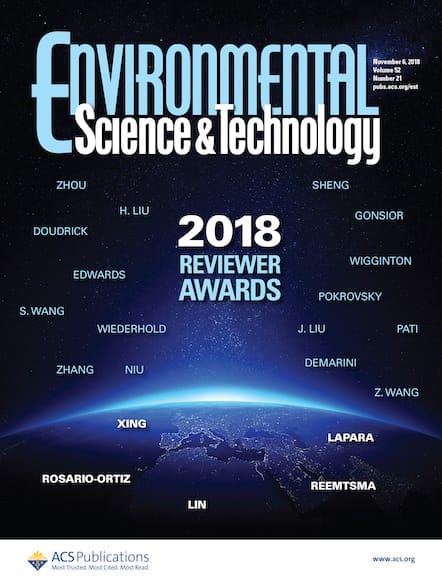Professor Kevin C. Jones of Lancaster University is the recipient of the 2020 American Chemical Society Award for Creative Advances in Environmental Science and Technology, making him the award’s 40th recipient. The award was to be presented at the ACS Spring 2020 National Meeting & Exposition in Philadelphia. However, that meeting was canceled in response […]

As a result, a Special Issue on persistent organic pollutants (POPs), entitled “POPs on the Global Scale: Sources, Distribution, Processes, and Lessons Learned for Chemicals Management,” was published in Environmental Science & Technology. This issue recognizes the contributions of Professor Jones to environmental organic chemistry in lieu of the award symposium.
As one of the world’s leading environmental organic chemists, Professor Jones’ research focuses on the sources, fates, and effects of environmental pollution. His research addresses some fundamental questions encompassing persistent organic chemicals (pesticides, industrial chemicals, waste products, etc.) in fundamental, practical, and real-world implications.
I caught up with Professor Jones to learn more about his career so far.
What drew you to environmental organic chemistry?
When I was at school, I became passionate about the damage we are doing to our planet by polluting it. This made me want to study environmental science as a degree. I then had the chance to do a Ph.D., which was actually on heavy metals in the environment, investigating linkages and transfers of pollutants between environmental compartments. Once I was offered my faculty position at Lancaster, I had the chance to think about possible directions for an independent line of research. I attended a Society of Environmental Toxicology and Chemistry (SETAC) conference in North America and was captivated by the work going on investigating POPs in the Great Lakes of North America and in the Arctic. I was fascinated by the interconnectivity of environmental systems. The field seemed integrated and collaborative, compared to what I had experienced previously, and I think these things – not just the science area – drew me in.
What were the biggest challenges for you in developing a research career?
I started a faculty position very young – aged 25. Lancaster had no other staff working in the areas I wanted to develop. So I had lots of early challenges in finding my way around university systems, juggling teaching and research, learning about funding, getting the resources to set up a lab, and developing the confidence to approach potential collaborators and funders. Looking back now, I can see that it was all a rapid and steep learning curve. Luckily, I had chosen an exciting and productive area, and I was determined to make things work out.
What do you consider some of the most important highlights from your career so far?
I could talk about key research findings or papers, but I actually get the most enjoyment from working with enthusiastic and committed students and international scientists, helping them get their careers up and running, and encouraging their passion and commitment. I have been lucky to supervise nearly 100 Ph.D. students through my career so far, and a large proportion of those have gone on to work in the discipline – in universities, institutes, companies, and organizations around the world. It is extremely fulfilling to know their skills are needed and making a contribution. I have also had many international links, projects, and collaborations, which have been great fun, important learning and life experiences, and a way in which the influence of our work can be seen.
What motivates you to be a researcher in this field of environmental science & technology?
A major motivation is to see that the environment has become part of mainstream thinking in society. Further progression is still urgently needed, of course. Another is the sense of wonder and excitement one gets from studying the natural world and trying to understand those processes better. A third is the desire to help and facilitate others, as mentioned above.
What are the major challenges in this area, and what type of work can we look forward to seeing from you in the future?
In very general terms, I think we now have a good understanding of how chemicals behave in the environment. We know much less about their effects at low doses, and research will continue to be active on that. However, the broader challenges – as discussed in my article in the Special Issue – are how to make informed decisions about the risks they pose and to reduce society’s unsustainable consumption and reliance on chemicals.
Read the Special Issue.
Explore articles published by Professor Kevin C. Jones in ACS Publications journals.
***
Persistent Organic Pollutants (POPs) and Related Chemicals in the Global Environment: Some Personal Reflections
Environ. Sci. Technol. 2021, 55, 14, 9400–9412
DOI: 10.1021/acs.est.0c08093
***
Use of the Dynamic Technique DGT to Determine the Labile Pool Size and Kinetic Resupply of Pesticides in Soils and Sediments
Environ. Sci. Technol. 2021, 55, 14, 9591–9600
DOI: 10.1021/acs.est.1c01354
***
Development and Applications of Novel DGT Passive Samplers for Measuring 12 Per- and Polyfluoroalkyl Substances in Natural Waters and Wastewaters
Environ. Sci. Technol. 2021, 55, 14, 9548–9556
DOI: 10.1021/acs.est.0c08092
